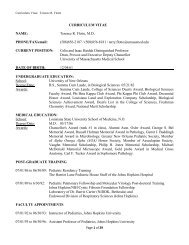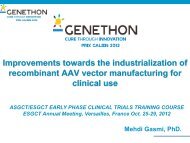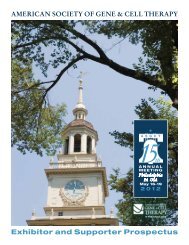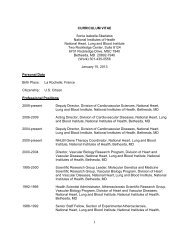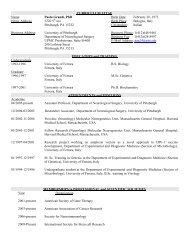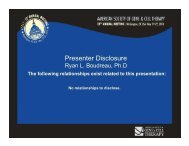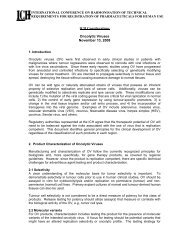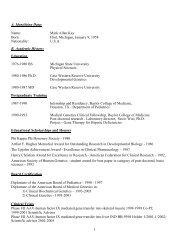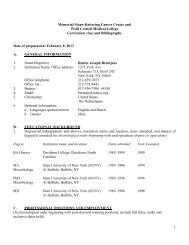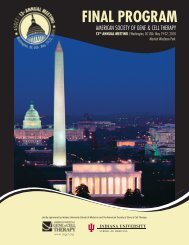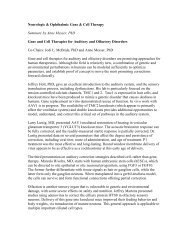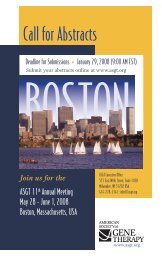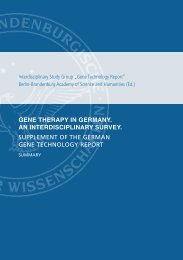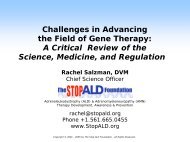Final Program - American Society of Gene & Cell Therapy
Final Program - American Society of Gene & Cell Therapy
Final Program - American Society of Gene & Cell Therapy
Create successful ePaper yourself
Turn your PDF publications into a flip-book with our unique Google optimized e-Paper software.
<strong>Program</strong> Schedule, Thursday, May 16, 2013<br />
Scientific Symposium 212<br />
10:30 am - 12:30 pm<br />
ROOM: BALLROOM D<br />
Frontiers <strong>of</strong> Cardiovascular <strong>Gene</strong> and <strong>Cell</strong> <strong>Therapy</strong><br />
CO-CHAIRS: David A. Dichek, MD and Michael J. Passineau, PhD<br />
SPEAKERS<br />
Charles R. Bridges, MD, ScD<br />
Challenges <strong>of</strong> <strong>Gene</strong> and <strong>Cell</strong> <strong>Therapy</strong> to the Heart<br />
In this presentation I will describe the main challenges <strong>of</strong> current cardiac cell and gene therapy with an emphasis on challenges to<br />
eficient delivery. I will give a detailed comparison <strong>of</strong> available gene and cell delivery techniques. I will discuss documented and<br />
potential complications <strong>of</strong> cell injections and gene transfer such as the risk <strong>of</strong> arrhythmias, incidence <strong>of</strong> coronary restenosis and<br />
malignancy. <strong>Final</strong>ly, I will focus on the most recent results <strong>of</strong> cardiac cell and gene therapy trials and the major lessons drawn from<br />
these trials.<br />
Thursday, May 16, 2013<br />
Andrew H. Baker, PhD<br />
Vascular MiRNA and Pulmonary Hypertension<br />
MicroRNAs (miRNAs) are short non-coding RNAs which post-transcriptionally regulate gene expression. miRNAs are important<br />
in governing cell differentiation, development and disease. We have investigated the role or individual miRNAs in pathological<br />
vascular remodeling, as well as the potential therapeutic value <strong>of</strong> manipulating selected miRNA in vivo. I will discuss these<br />
indings with emphasis on vascular remodeling associated with both venous and arterial remodeling, i.e. vein graft failure and the<br />
development <strong>of</strong> pulmonary arterial hypertension.<br />
Marc Penn, MD, PhD<br />
<strong>Gene</strong> <strong>Therapy</strong> for Heart Failure<br />
The success <strong>of</strong> establishing antegrade low in patients with acute myocardial infarction has led to signiicant advancements in the<br />
survival <strong>of</strong> patients with acute ischemic events <strong>of</strong> the myocardium. Unfortunately this success had led to a signiicant increase in<br />
the prevalence <strong>of</strong> heart failure. To address this need several investigators have turned to gene therapy as a strategy to either repair,<br />
restore or optimize cardiac function. Excitingly these strategies have entered clinical trials with encouraging results. We will discuss<br />
the strategies currently under investigation as well as those that maybe entering the clinical realm in the future.<br />
Doris A. Taylor, PhD<br />
Personalizing <strong>Cell</strong> <strong>Therapy</strong>: Initial CCTN Experience<br />
Scientific Symposium 213<br />
10:30 am - 12:30 pm<br />
ROOM: BALLROOM B<br />
New Paradigms for Immune <strong>Cell</strong> Therapies<br />
CO-CHAIRS: Cynthia Dunbar, MD and Paris Margaritis, DPhil<br />
SPEAKERS<br />
David L. Porter, MD<br />
Chimeric Antigen Receptor Therapies for Lymphoid Malignancies<br />
This presentation will describe the biological activity and outcomes <strong>of</strong> patients treated with CART19 (CTL019) cells; these are<br />
autologous T cells collected by leukapheresis and transduced with a lentivirus encoding anti-CD19 scFv linked to 4-1BB and CD3-z<br />
signaling domains. <strong>Gene</strong>-modiied T cells can then target CD19+ cells. <strong>Cell</strong>s are expanded and activated ex-vivo by exposure to anti-<br />
CD3/CD28 beads prior to infusion. Patients are treated for advanced and/or refractory CLL or ALL. We previously reported marked<br />
in-vivo expansion, long-term persistence and effective anti-tumor activity <strong>of</strong> CART19 cells in 3 patients with CLL with relatively<br />
short follow up (Porter, et al NEJM 2011; Kalos et al Sci Trans Med 2011). Results from the clinical trials will be updated with longterm<br />
follow-up and include presentation <strong>of</strong> data from a larger cohort <strong>of</strong> patients. We show that these cells can undergo massive<br />
in-vivo expansion, persist for more than 2 years and remain biologically active, and can induce potent and sustained responses for<br />
patients with advanced, refractory and high risk CLL and relapsed, refractory ALL.<br />
Maria-Grazia Roncarolo, MD, PhD<br />
<strong>Cell</strong> <strong>Therapy</strong> with Regulatory T <strong>Cell</strong>s to Dampen Undesired Immune Responses<br />
48<br />
<strong>Final</strong> <strong>Program</strong> SALT LAKE CITY, UTAH May 15–18, 2013



